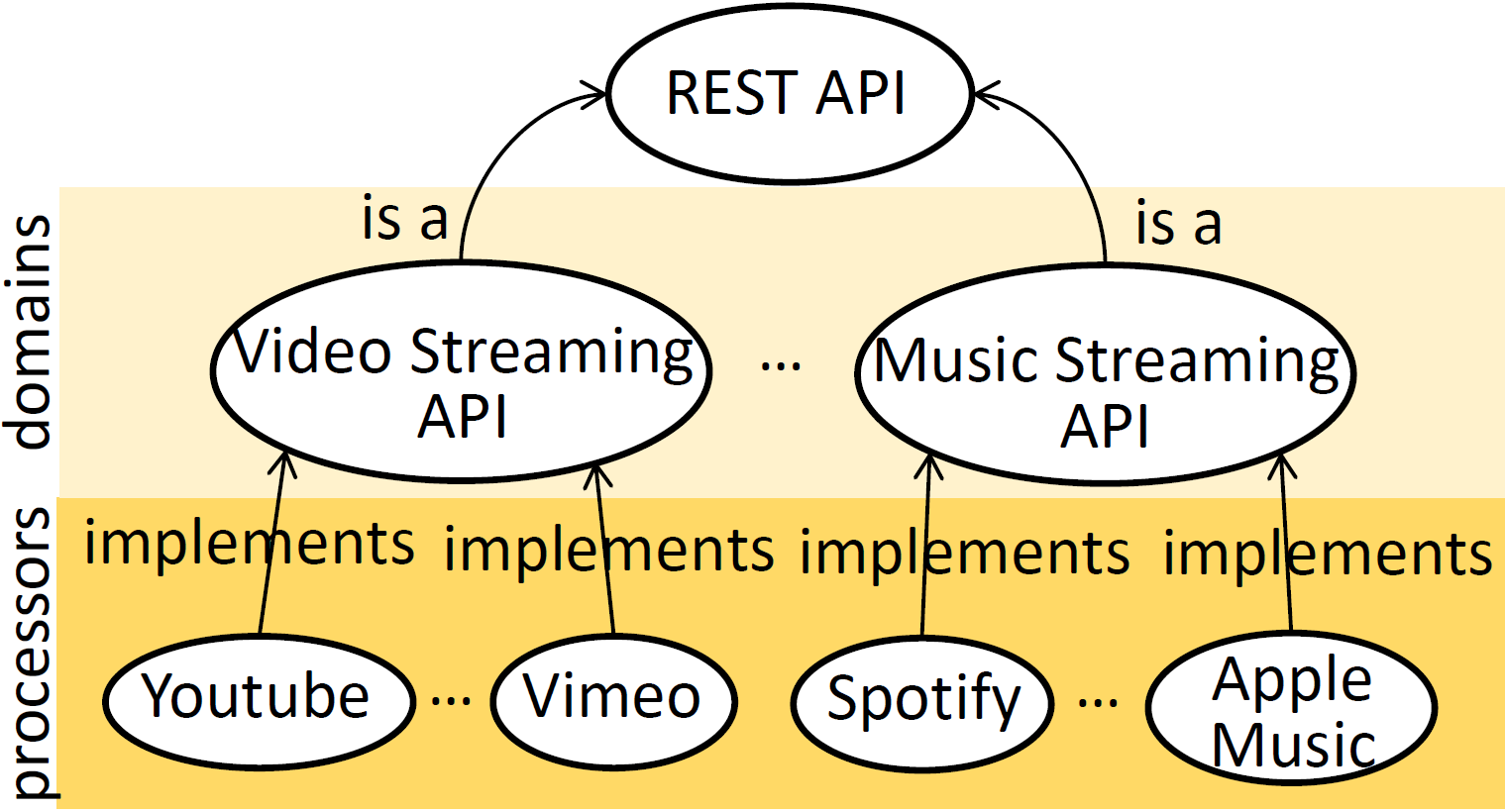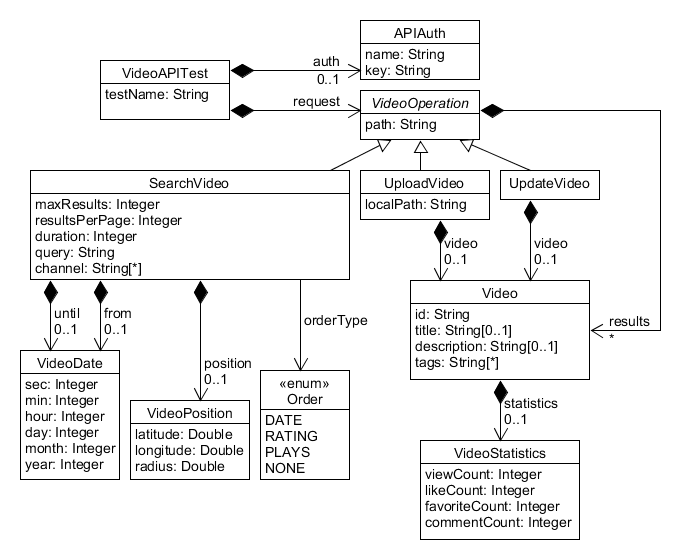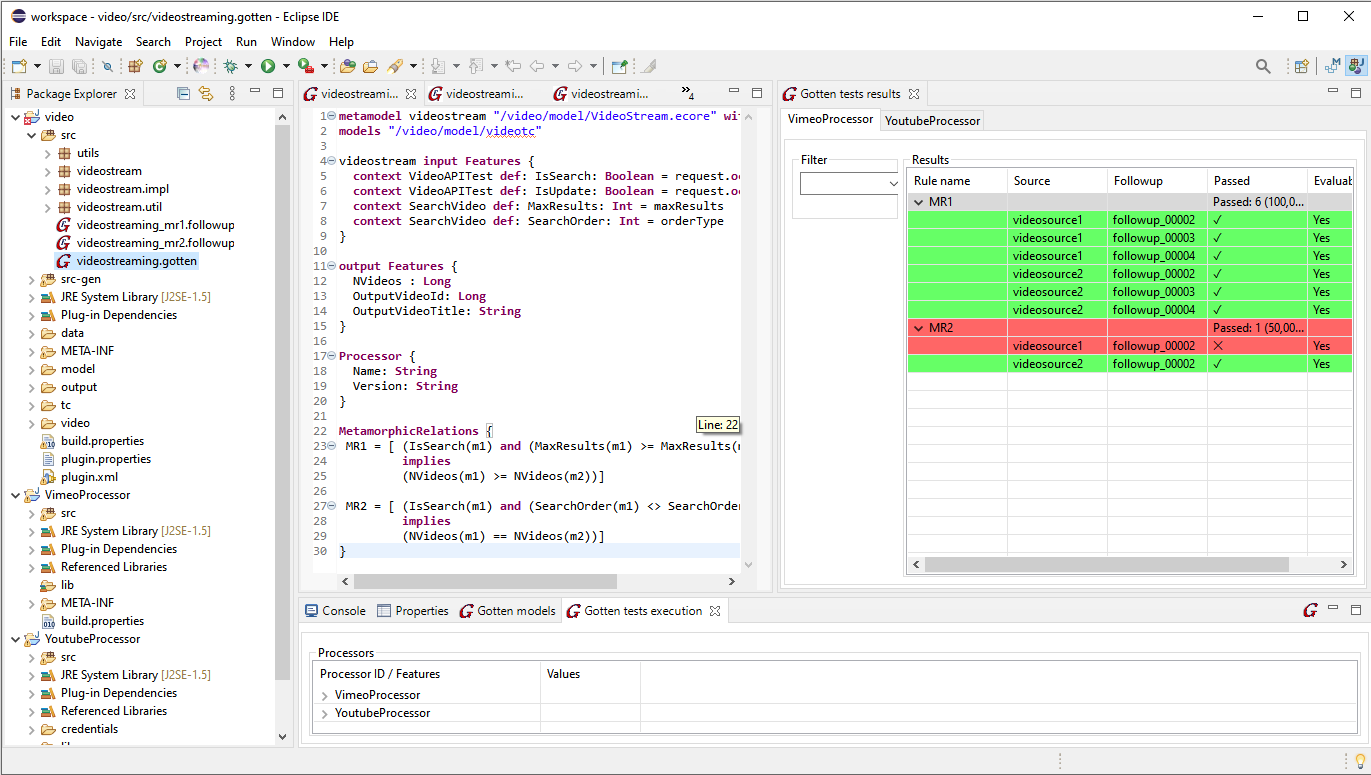Gotten for Video Streaming APIs
Gotten for video streaming APIs running example
The goal here is to show Gotten’s generality and flexibility by describing an MT environment for video streaming APIs. To show the power of our approach, we group APIs into domains, like video streaming, audio streaming, hotel bookings, or flight bookings, as figure below depicts:

This way, we can describe each domain by means of a meta-model, define a set of MRs for each of them, and the different processors that implement the corresponding API, such as YouTube and Vimeo in the case of video streaming.
The following figure shows a meta-model to represent video streaming APIs. Class VideoAPITest represent a test case, which has a name (attribute testName). For simplicity, a test case is made of a single operation, which can be of three kinds: search, upload and update. Upload and update require a video parameter, described by an id, and optionally a title, a description, and a list of tags. Each video may provide statistical information (class VideoStatistics) like the number of visualisations and likes received. The output of the execution of these operations is stored in the reference results.

The mrDSL program for video streaming APIs
Since it is difficult to establish an oracle to test if a video streaming API performs as expected, we use MT. The following listing shows the mrDSL program created with the Gotten framework to apply MT to this video streaming APIs domain:
metamodel videostream "/video/model/VideoStream.ecore" with m1, m2
models "/video/model/videotc"
videostream input Features {
context VideoAPITest def: IsFullSearch: Boolean =
request.oclIsTypeOf(SearchVideo)
and request.oclAsType(SearchVideo).maxResults = -1
context VideoAPITest def: IsUpdate: Boolean = request.oclIsTypeOf(UpdateVideo)
context SearchVideo def: MaxResults: Int = maxResults
context SearchVideo def: SearchOrder: Int = orderType
context SearchVideo def: UntilYear: Int = until.year
context SearchVideo def: FromYear: Int = from.year
context SearchVideo def: Radius: Double = position.radius
}
output Features {
NVideos : Long
Results: Set
OutputVideoId: Long
OutputVideoTitle: String
}
Processor {
Name: String
Version: String
}
MetamorphicRelations {
MR1 = [ (IsFullSearch(m1) and SearchOrder(m1) <> SearchOrder(m2))
implies (NVideos(m1) == NVideos(m2)) ]
MR2 = [ (IsFullSearch(m1) and UntilYear(m1) < FromYear(m2))
implies (Results(m1)->excludes(Results(m2))) ]
MR3 = [ (IsFullSearch(m1) and Radius(m1) > Radius(m2))
implies (Results(m1)->includes(Results(m2))) ]
MR4 = [ (IsFullSearch(m1) and MaxResults(m1) >= MaxResults(m2))
implies (NVideos(m1) >= NVideos(m2))]
MR5 = [ (IsUpdate(m1) and m1 == m2)
implies
(OutputVideoId(m1) <> OutputVideoId(m2) and
OutputVideoTitle(m1) == OutputVideoTitle(m2))]
}
MRs for video streaming APIs brief description
Below we provide a brief description of these 5 MRs for video streaming APIs:
| Relation | Description |
|---|---|
| MR1 | The search order of m1 is different to the search order of m2. |
| MR1i = [ (IsFullSearch(m1) and SearchOrder(m1) <> SearchOrder(m2)) ] | |
| The number of videos returned by the search m1 should be equal to the number of videos returned by the search m2. | |
| MR1o = [ (NVideos(m1) == NVideos(m2))] | |
| MR2 | The search until year of m1 is lower than the search from year of m2. |
| MR2i = [ (IsFullSearch(m1) and UntilYear(m1) < FromYear(m2)) ] | |
| The set of results returned by the search m1 should exclude the set of results returned by the search m2. | |
| MR2o = [ (Results(m1)->excludes(Results(m2)))] | |
| MR3 | The search radius of m1 is greater than the search radius of m2. |
| MR3i = [ (IsFullSearch(m1) and Radius(m1) > Radius(m2)) ] | |
| The set of results returned by the search m1 should include the set of results returned by the search m2. | |
| MR3o = [ (Results(m1)->includes(Results(m2)))] | |
| MR4 | The maximum number of videos requested by the search m1 is greater than or equals to the maximum number of videos requested by the search m2. |
| MR4i = [ (IsSearch(m1) and MaxResults(m1) >= MaxResults(m2)) ] | |
| The number of videos returned by the search m1 should be greater than or equal to the number of videos returned by the search m2. | |
| MR4o = [ (NVideos(m1) >= NVideos(m2))] | |
| MR5 | The update m1 is equal to the update m2. |
| MR5i = [ (IsUpdate(m1) and m1 == m2) ] | |
| The video id returned by m1 should be different to the video id returned by m2. The video title returned by m1 should be equal to the video title returned by m2. | |
| MR5o = [ (OutputVideoId(m1) <> OutputVideoId(m2)) and (OutputVideoTitle(m1) == OutputVideoTitle(m2))) ] |
Conducted experiment description with Gotten for YouTube and Vimeo
We have conducted an experiment for MR1, MR4 and MR5. For MR1 and MR4, we designed the source test cases selecting queries based on trending searches from YouTube and Vimeo (e.g ‘world cup’, ‘esports’, etc.) and complemented them with some corner cases extracted from Segura et al.1, e.g. ‘winter pentathlon 1949’ and ‘mistrustfully’. All tests could be reused for YouTube and Vimeo.
Executing all tests in YouTube took 4 minutes and 4 seconds, and 10 minutes and 36 seconds for Vimeo. The results show that the proposed framework is not only able to model the MRs provided - in natural language - by Segura et al.1, but is able to reproduce the obtained results and detect real issues reported in the issue tracking systems of the studied platforms.
Gotten for YouTube and Vimeo project download link
You can download the Gotten project for YouTube and Vimeo platforms along with all the data generated and used in the performed experiment described above here:
Gotten for video streaming APIs environment in action
- Click on the image below to watch a video demo of the Gotten environment for Video Streaming APIs:
Acknowledgements
This work has been funded by the Spanish Ministry of Science (RTI2018-095255-B-I00, project “MASSIVE”) and the R&D programme of Madrid (P2018/TCS-4314, project “FORTE”).
